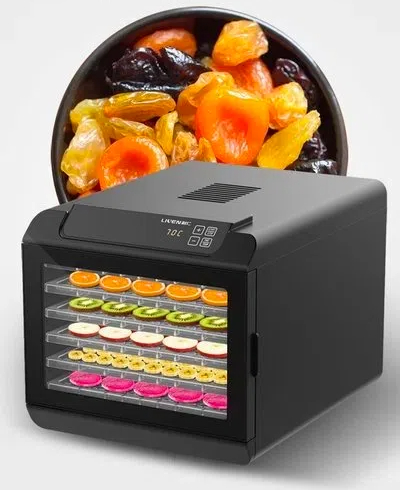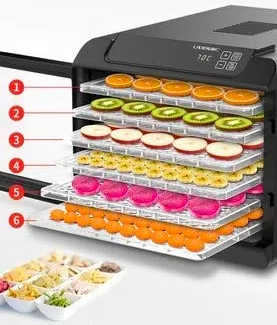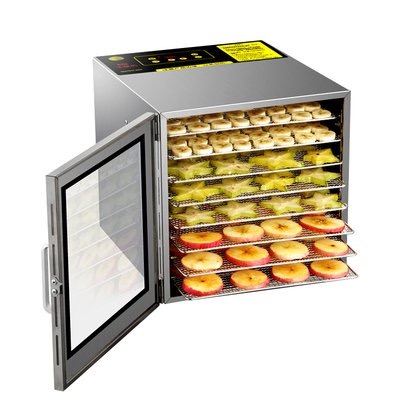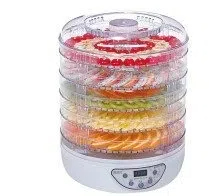
Content Menu
● Introduction
● The Technology Behind Dryer Machines for Fruit
>> Key Components of a Dryer Machine for Fruit
● Types of Dryer Machines for Fruit
>> 1. Solar Dryers
>> 2. Electric Dehydrators
>> 3. Heat Pump Dryers
>> 4. Freeze Dryers
● Benefits of Using Dryer Machines for Fruit
>> 1. Extended Shelf Life
>> 2. Preservation of Nutrients
>> 3. Space-Saving Storage
>> 4. Versatility in Culinary Applications
>> 5. Reduction of Food Waste
● Choosing the Right Dryer Machine for Fruit
● How to Use a Dryer Machine for Fruit
>> Step 1: Preparation
>> Step 2: Arrangement
>> Step 3: Setting Up the Dryer
>> Step 4: Drying Process
>> Step 5: Cooling and Storage
● Popular Fruits for Drying
● Innovative Uses for Dried Fruits
● Maintenance and Care of Dryer Machines for Fruit
● The Future of Fruit Drying Technology
● Conclusion
● Frequently Asked Questions
>> 1. What is the optimal temperature for drying most fruits?
>> 2. How long does it take to dry fruits using a dryer machine?
>> 3. Are nutrients lost during the fruit drying process?
>> 4. Can I dry different types of fruits together in the same batch?
>> 5. How can I tell if my dried fruits are sufficiently dehydrated?
Introduction
In today's fast-paced world, where convenience and health-conscious choices go hand in hand, dryer machines for fruit have emerged as a game-changer in food preservation. These innovative devices offer a perfect solution for those looking to extend the shelf life of their favorite fruits while retaining their nutritional value and natural flavors. Whether you're a home enthusiast or a commercial producer, understanding the ins and outs of fruit dryer machines can revolutionize your approach to food preservation and healthy snacking.
The Technology Behind Dryer Machines for Fruit
Dryer machines for fruit utilize advanced technology to remove moisture from fruits efficiently. The process involves circulating warm air around the fruit, gradually extracting water content while preserving essential nutrients and flavors. This method of dehydration has come a long way from traditional sun-drying techniques, offering more control, consistency, and hygiene in the drying process.
Key Components of a Dryer Machine for Fruit
1. Heating Element: Generates warm air for the drying process.
2. Fan: Circulates the warm air evenly throughout the drying chamber.
3. Trays or Racks: Hold the fruit during the drying process.
4. Temperature Control: Allows users to adjust the heat level for different types of fruit.
5. Timer: Enables setting specific drying durations.

Types of Dryer Machines for Fruit
1. Solar Dryers
Solar dryers harness the power of the sun to dry fruits naturally. They come in two main types:
- Direct Solar Dryers: Fruits are placed directly under sunlight in a protected environment.
- Indirect Solar Dryers: Use solar collectors to heat air, which is then circulated through the drying chamber.
Solar dryers are eco-friendly and cost-effective, making them popular in regions with abundant sunlight.
2. Electric Dehydrators
Electric dehydrators are the most common type of dryer machines for fruit. They offer precise temperature control and consistent results. These machines come in various sizes, from small countertop models for home use to large industrial units for commercial production.
3. Heat Pump Dryers
Heat pump dryers are energy-efficient machines that recirculate and dehumidify the air used in the drying process. They are particularly effective for temperature-sensitive fruits, as they operate at lower temperatures while still achieving excellent drying results.
4. Freeze Dryers
Freeze dryers use a process called lyophilization, where fruits are frozen and then placed in a vacuum chamber. The ice is then sublimated directly into vapor, leaving behind perfectly preserved fruit with minimal structural changes.
Benefits of Using Dryer Machines for Fruit
1. Extended Shelf Life
By removing moisture, dryer machines for fruit significantly extend the shelf life of fruits, allowing you to enjoy your favorite seasonal fruits year-round.
2. Preservation of Nutrients
Unlike some preservation methods that can degrade nutritional content, proper use of dryer machines for fruit helps retain most of the vitamins, minerals, and antioxidants present in fresh fruits.
3. Space-Saving Storage
Dried fruits take up less space than their fresh counterparts, making storage and transportation more efficient.
4. Versatility in Culinary Applications
Dried fruits can be used in a variety of culinary applications, from snacking to baking and cooking, adding natural sweetness and intense flavor to dishes.
5. Reduction of Food Waste
By drying excess fruits, you can significantly reduce food waste, especially during peak harvest seasons.
Choosing the Right Dryer Machine for Fruit
When selecting a dryer machine for fruit, consider the following factors:
1. Capacity: Determine how much fruit you plan to dry regularly.
2. Energy Efficiency: Look for models with good energy ratings to save on operating costs.
3. Temperature Control: Opt for machines with adjustable temperature settings for different types of fruit.
4. Ease of Use: Choose a dryer with user-friendly controls and easy-to-clean components.
5. Noise Level: If using at home, consider the noise output of the machine.
6. Budget: Balance your needs with your budget constraints.

How to Use a Dryer Machine for Fruit
Step 1: Preparation
- Wash and dry the fruits thoroughly.
- Remove any blemishes or overripe parts.
- Slice fruits evenly for consistent drying.
Step 2: Arrangement
- Place fruit slices on the drying trays, ensuring they don't overlap.
- Leave space between pieces for air circulation.
Step 3: Setting Up the Dryer
- Set the temperature according to the type of fruit being dried.
- Adjust the timer based on the fruit's moisture content and desired dryness.
Step 4: Drying Process
- Start the dryer and allow it to run for the set time.
- Check periodically and rotate trays if necessary for even drying.
Step 5: Cooling and Storage
- Once dried, allow fruits to cool completely.
- Store in airtight containers in a cool, dry place.
Popular Fruits for Drying
1. Apples
2. Bananas
3. Strawberries
4. Mangoes
5. Pineapples
6. Apricots
7. Grapes (to make raisins)
8. Peaches
9. Pears
10. Blueberries
Each fruit may require different drying times and temperatures, so it's essential to consult your dryer machine's manual or reliable drying guides.
Innovative Uses for Dried Fruits
1. Homemade Trail Mix: Combine dried fruits with nuts and seeds for a healthy snack.
2. Fruit Powders: Grind dried fruits into powders for natural flavor enhancers.
3. Fruit Leather: Create all-natural fruit rolls for a fun, healthy treat.
4. Infused Teas: Add dried fruits to loose-leaf teas for unique flavor combinations.
5. Decorative Garnishes: Use thinly sliced dried fruits as elegant garnishes for desserts and cocktails.
Maintenance and Care of Dryer Machines for Fruit
To ensure the longevity and optimal performance of your dryer machine for fruit, follow these maintenance tips:
1. Clean trays and interior after each use to prevent residue buildup.
2. Check and clean air filters regularly to maintain proper airflow.
3. Inspect the heating element and fan for any signs of wear or damage.
4. Store the machine in a clean, dry place when not in use.
5. Follow the manufacturer's guidelines for any specific maintenance requirements.
The Future of Fruit Drying Technology
As technology advances, we can expect to see even more innovative features in dryer machines for fruit:
1. Smart Controls: Wi-Fi-enabled dryers that can be controlled via smartphone apps.
2. AI-Powered Drying: Machines that use artificial intelligence to optimize drying cycles for different fruits.
3. Improved Energy Efficiency: Development of more eco-friendly drying technologies.
4. Hybrid Systems: Combination of different drying methods for optimal results.
5. Compact Designs: More space-efficient models for home users with limited kitchen space.
Conclusion
Dryer machines for fruit have revolutionized the way we preserve and enjoy nature's sweet bounty. From extending shelf life to retaining nutritional value, these devices offer numerous benefits for both home users and commercial producers. As technology continues to evolve, we can look forward to even more efficient and innovative ways to dry and preserve fruits, ensuring that we can enjoy their goodness year-round.
Whether you're looking to reduce food waste, create healthy snacks, or explore new culinary possibilities, investing in a quality dryer machine for fruit is a step towards a more sustainable and flavorful future. Embrace the world of fruit drying and discover the endless possibilities it offers for your kitchen and lifestyle.

Frequently Asked Questions
1. What is the optimal temperature for drying most fruits?
Answer: The optimal temperature for drying most fruits typically ranges between 125°F to 135°F (52°C to 57°C). However, this can vary depending on the specific fruit and desired outcome. It's important to consult your dryer machine's manual or a reliable fruit drying guide for specific recommendations.
2. How long does it take to dry fruits using a dryer machine?
Answer: Drying times can vary significantly depending on the type of fruit, its water content, the thickness of the slices, and the efficiency of your dryer machine. On average, it can take anywhere from 6 to 36 hours. For example, thinly sliced apples might take 6-12 hours, while whole strawberries could take up to 24-36 hours.
3. Are nutrients lost during the fruit drying process?
Answer: While some nutrient loss is inevitable during any preservation process, proper use of a dryer machine for fruit helps retain a significant portion of the original nutrients. Vitamins A and C are the most sensitive to heat and may decrease, but fiber, minerals, and many antioxidants are well-preserved. The concentration of nutrients per weight often increases as water is removed.
4. Can I dry different types of fruits together in the same batch?
Answer: It's generally not recommended to dry different types of fruits together in the same batch. Different fruits have varying drying times and may require different temperature settings. Mixing fruits can lead to uneven drying results. For best results, dry similar fruits together or use separate trays for different fruits if your machine allows for tray removal during the drying process.
5. How can I tell if my dried fruits are sufficiently dehydrated?
Answer: Properly dried fruits should be pliable but not sticky or tacky to the touch. They should not have any visible moisture when cut open. For most fruits, you should be able to squeeze them without any moisture coming out. If you're unsure, it's better to err on the side of over-drying slightly, as under-dried fruits can develop mold during storage.












